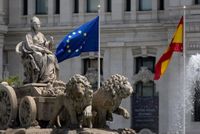On May 9, 2025, Europe celebrates a significant milestone: the 75th anniversary of the Schuman Declaration, a pivotal moment that laid the groundwork for the European Union. This historic proposal, presented in 1950 by French Foreign Minister Robert Schuman, aimed to foster cooperation among European nations, particularly focusing on the coal and steel industries. As we reflect on this anniversary, experts like Juan Manuel de Faramiñán, a professor at the University of Jaén, emphasize the need to reaffirm the original values that underpin the EU, which they believe are currently under threat.
The Schuman Declaration emerged in a context marked by the devastation of World War II, which had claimed over 60 million lives by 1945. The ravages of war left Europe in ruins, both physically and morally, prompting a critical question: how could such a catastrophe be prevented in the future? Schuman's vision sought to unite former adversaries through economic cooperation, thereby eliminating the possibility of war. This idea gave birth to the European Coal and Steel Community (CECA), which included West Germany, France, Italy, Belgium, the Netherlands, and Luxembourg. This initial cooperation model eventually evolved into the European Economic Community (EEC) and, ultimately, the European Union, which now comprises 27 member states, including Spain, which joined in 1986.
Europe Day is not merely a historical commemoration; it serves as a reminder of the achievements of over seven decades of collaboration among nations that once faced off in bloody conflicts. The EU stands as a beacon of political and economic integration, advocating for human rights, democracy, and the rule of law. Celebrating this day allows citizens to reflect on the importance of upholding and strengthening these values in the face of current challenges, such as climate change, migration crises, and geopolitical tensions.
On this special day, various events are organized across Europe, inviting citizens to engage with their institutions. Activities include open days at key EU institutions like the European Parliament and the European Commission, conferences, debates, and cultural events designed to promote the continent's diversity and richness. In Spain, cities such as Madrid, Barcelona, Seville, and Valencia have planned public debates and educational activities to engage younger generations in the European project.
However, this year’s celebrations occur against a backdrop of significant challenges. The EU faces unprecedented internal and external pressures. Internally, rising disillusionment among citizens, the rise of euroscepticism, and populist nationalism threaten the European project. The aftermath of Brexit serves as a stark reminder of these challenges. Maintaining cohesion and solidarity across member states remains a pressing concern, particularly during economic, migratory, and energy crises.
Externally, geopolitical pressures are mounting. Countries like Russia and China view the EU with suspicion, sometimes as a rival or obstacle. The ongoing war in Ukraine has underscored the urgency for a strong, united Europe capable of defending its values: democracy, human rights, freedom, and the rule of law. As Faramiñán notes, the invasion of Ukraine has contributed to a destabilization of the global order, highlighting the necessity for Europe to remain united and resilient.
In light of these challenges, the message of Europe Day resonates more than ever. It’s a call to action for citizens to defend the peace and prosperity achieved through decades of cooperation. The day serves as a reminder that building a united Europe is an ongoing process, requiring commitment from each generation. As Schuman himself stated, peace is not imposed; it is constructed through collective effort.
This year’s celebration also coincides with the upcoming European elections scheduled for June 2025, further emphasizing the importance of active citizen participation in shaping the future of the continent. The events planned for Europe Day are designed not only to commemorate the past but also to inspire a renewed commitment to a more united, just, and supportive Europe.
Ultimately, Europe Day is a moment for reflection and commitment. It’s about recognizing that the values of peace, dialogue, cooperation, and human dignity are essential in the face of rising authoritarianism and conflict. This day should not only commemorate the achievements of the past but also renew the pact among the peoples of Europe who decided to walk together toward a brighter future.
As we celebrate this anniversary, let us remember that the spirit of cooperation that inspired the Schuman Declaration is needed now more than ever. The challenges may be daunting, but the commitment to a united Europe remains a powerful force for good in a world that often seems divided.

